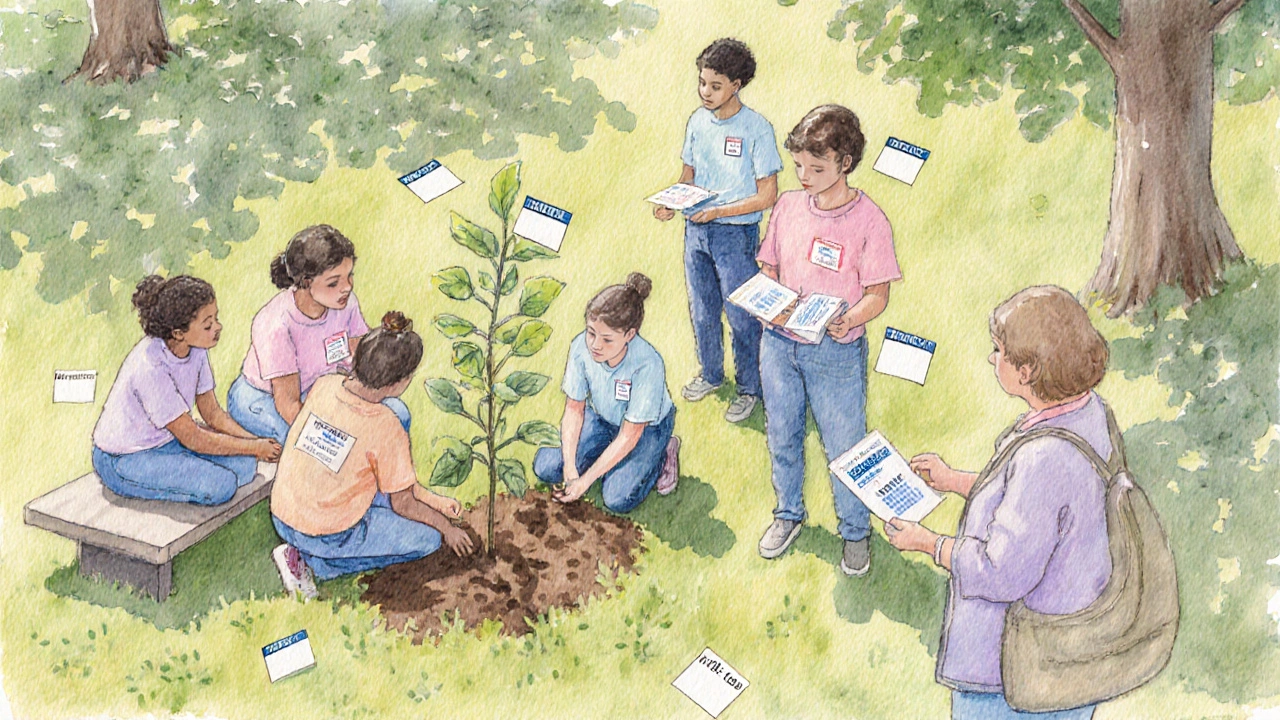Ever wondered what to call someone who gives their time without pay? It sounds simple, but the word you pick can shape how people see the work, the organization, and even the cause itself. Below we unpack the most common labels, the subtle differences between them, and when each fits best.
Defining the Core: Volunteer is a person who freely offers services, time, or skills to help a cause, organization, or community without expecting financial compensation
In everyday language a volunteer is the catch‑all term. Charities, schools, hospitals, and local councils all talk about recruiting volunteers because it’s instantly understood. The definition is broad on purpose - it covers anyone from a neighbour shoveling snow for an elderly resident to a medical professional volunteering abroad.
Synonyms and Their Nuances
While "volunteer" works in most contexts, other words often surface in job ads, press releases, or casual conversation. Below is a quick reference table that lines up the most frequently used alternatives, how they differ, and where you’ll typically see them.
| Term | Typical Setting | Key Nuance |
|---|---|---|
| Volunteer | Non‑profits, community groups, schools | Broad, neutral, universally understood |
| Helper | One‑off events, informal assistance | Casual, often short‑term, no formal commitment |
| Community Servant | Local council projects, civic clean‑ups | Emphasises service to a geographic area |
| Philanthropist | Large‑scale giving, foundations | Usually implies significant financial or resource contributions, not just time |
| Activist | Advocacy campaigns, social‑justice movements | Focuses on driving systemic change, often through protests or lobbying |
| Good Samaritan | Emergency aid, spontaneous assistance | Highlights altruism in unexpected situations |
| Service Member | Formal programs (e.g., AmeriCorps, NHS Volunteers) | Suggests structured training and a defined role |
Choosing the Right Word for Your Audience
Think about the tone you want to set. If your goal is to attract a wide pool of laypeople, stick with "volunteer" - it’s inclusive and low‑commitment sounding. For a campaign that leans on civic pride, "community servant" or "service member" can boost a sense of belonging. When addressing donors or high‑net‑worth individuals, "philanthropist" may resonate more, even though it traditionally leans toward monetary support.
Here’s a quick decision guide:
- Casual, one‑off help: use "helper" or "good Samaritan".
- Ongoing, structured program: "service member" or "volunteer".
- Focus on local impact: "community servant".
- Emphasis on advocacy: "activist".
- Highlight large‑scale giving: "philanthropist".

Related Concepts That Shape Volunteer Identity
Understanding the broader ecosystem helps you pick the most precise label. Below are six key concepts that often appear alongside volunteer discussions.
- Volunteerism is the practice or philosophy of offering free time and skills for the public good. It captures the spirit behind every individual act of service.
- Civic Engagement refers to participation in public life, from voting to community projects. Volunteering is a core pillar of civic engagement.
- Philanthropy involves the desire to promote the welfare of others, often through donations of money, time, or expertise. While philanthropy includes financial giving, time‑based giving is a vital subset.
- Community Service describes organized activities that address local needs, usually orchestrated by schools or local governments. Many volunteers identify primarily as community service participants.
- Nonprofit organizations are entities that operate for public benefit rather than profit, relying heavily on volunteers. The term often appears in volunteer job postings.
- Social Impact measures the effect of an organization’s actions on the well‑being of people and the planet. Volunteers frequently cite social impact as their motivator.
How Organizations Title Their Volunteers
Beyond generic labels, many groups give volunteers a title that reflects the role’s scope. Common internal titles include:
- Team Member - used by large charities to underline that volunteers are part of the core workforce.
- Program Ambassador - often seen in health‑related campaigns where volunteers spread awareness.
- Event Supporter - a short‑term label for those helping at festivals, fundraisers, or sports events.
- Mentor - applied when volunteers provide one‑on‑one guidance, such as in youth tutoring programs.
Choosing a title that matches the duties helps volunteers feel respected and clarifies expectations for the organization.

Key Takeaways
- The universal term is volunteer, safe for any audience.
- Use "helper" for casual, short‑term work; "service member" for structured programs.
- When local pride matters, "community servant" or "community service" resonate well.
- Activists, philanthropists, and good Samaritans highlight specific motivations.
- Pair the chosen label with an appropriate title (e.g., "Team Member", "Mentor") to boost engagement.
Frequently Asked Questions
Can I use "volunteer" and "helper" interchangeably?
They overlap, but "helper" feels more informal and temporary. If you need a term that suggests commitment, stick with "volunteer".
What's the difference between a volunteer and a philanthropist?
A philanthropist usually contributes significant financial resources or large‑scale assets. A volunteer contributes time and skills, often without a monetary component.
Is "activist" considered a volunteer role?
Activism can be volunteer‑based, but the label stresses advocacy and systemic change rather than direct service.
Why do some charities avoid the word "volunteer" in job ads?
They may want to attract candidates with specific skills, so they use titles like "program ambassador" or "community liaison" to signal higher responsibility.
Does "good Samaritan" have a legal meaning?
In many jurisdictions, the term aligns with "Good Samaritan laws" that protect people who offer emergency help from liability.
Whether you call them volunteers, helpers, or community servants, the core idea stays the same: people are giving their time to make a difference. Choose the word that matches the tone of your message, and you’ll attract the right kind of commitment.
